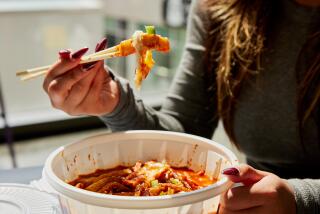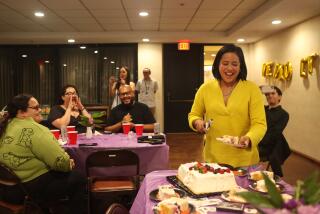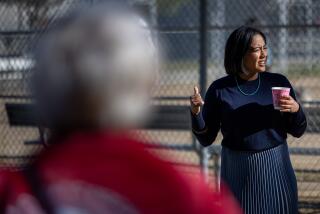David Ryu’s L.A. City Council campaign energizes Korean American voters
Just a few years after Los Angeles underwent a bitter battle over political representation of Asian Americans, voters will decide this month whether to elect the city’s first-ever Korean American City Council member.
The rise of candidate David Ryu in a district abutting Koreatown has energized many of the same activists who complained Asian Americans were treated unfairly when L.A. redrew council district lines. The chance to elect the 39-year-old hospital development director in a head-to-head May 19 runoff election also has mobilized some Korean Americans previously indifferent to City Hall.
At the same time, his bid has drawn a powerful opponent who was at odds with Ryu and other activists during the redistricting fight: City Council President Herb Wesson, whose Mid-City district includes the bulk of Koreatown. Many residents there lobbied unsuccessfully for a new district that would join Koreatown with nearby neighborhoods with significant numbers of Asian American voters.
In the aftermath of that battle, Ryu winning a runoff election spot in the Sherman Oaks-to-Silver Lake district is especially notable, some Korean American observers say, because the district is far from an Asian American stronghold. Only 7.4% of its registered voters are Asian American, according to a 2012 city analysis.
“This is perhaps the single most important moment for Korean Americans in electoral politics in Los Angeles history,” said Loyola Marymount University professor Edward J.W. Park. “It’s even more significant than if they were able to carve out some sort of an Asian American district.”
Ryu’s opponent, Carolyn Ramsay, is the former chief of staff to the district’s current councilman, Tom LaBonge, who is being forced from office by term limits. Ryu hasn’t made his Korean roots a central theme in the campaign. He routinely recounts immigrating to the U.S. when he was 6, but mainly portrays himself as a City Hall outsider swearing off campaign cash from local developers and pledging to reform council office spending.
“I don’t think David being Korean is really the issue,” said Paul Song, who hosted a Ryu fundraiser and leads a liberal nonprofit. “It’s whether he is LaBonge or not.”
Still, his campaign has resonated across a region with the largest Korean American population in the country. Ryu, a leading fundraiser in the March primary election, counts many donors with Korean surnames among his contributors. Ahead of the crowded primary election, an independent committee backing his candidacy collected tens of thousands of dollars from Korean American business owners. In that race, Ryu led in scattered precincts but had especially big margins in neighborhoods near Koreatown.
The only Asian American — who was not of Korean descent — who has served on the L.A. council left in 1993. “We’re overdue to have our voice heard,” said 73-year-old retired businessman and Hancock Park resident Eugene Ma, who like several residents and business owners was interviewed in Korean. “A hundred years into Korean immigration and no city councilman.”
Ryu is part of the “knee-high generation” of Korean Americans who came to the U.S. as children decades ago, after immigration rules were changed to allow more Asian Americans into the country, said Cal State L.A. professor emeritus of sociology Eui-Young Yu. Fluent in English, steeped in American culture and now hitting middle age, Yu said, they are seen as having a better chance than the elder generation at filling a void in political leadership.
Right now, “for us to meet politicians, consult them and make demands, it’s like reaching for the stars,” said Thomas J. Shin, a 53-year-old who runs an alternative medicine clinic. “They show their face when they need something, during elections. Once it’s over, that’s it.”
David Y. Choi, who heads an entrepreneurship center at Loyola Marymount University, said he didn’t follow city politics for years because he was discouraged by the way the Korean American community had been “gerrymandered.” The 48-year-old also recalled the 1992 riots after the verdicts in the Rodney King police abuse case.
“We’re the population that could not get police protection,” he said. “Two thousand businesses went up in flames.”
Choi said Ryu, whom he sees as independent of City Hall interests, is the first local politician he’s supported with a campaign contribution.
Jung Koo Kang, a 72-year-old retired clothing wholesaler, also said he’d rarely paid attention to city government since immigrating to L.A. decades ago. Now, he’s making phone calls and introducing Ryu to his neighbors, saying he is drawn to the candidate’s youth and energy.
With Ryu’s campaign, “it feels like Korean people are getting to know American politics and getting interested,” Kang said.
During the redistricting fight, Korean American activists publicly accused council President Wesson of treating Koreatown businesses like an ATM for campaign cash, then ignoring neighborhood needs. Wesson has strongly disputed such claims, saying he helped deliver a senior center, affordable housing and other improvements to the area.
In the Ryu-versus-Ramsay race, Wesson endorsed Ramsay and recently hosted a $700-a-ticket fundraiser for her. Ramsay, who has won a long list of City Hall endorsements, reported collecting more than $63,000 in $700 contributions — the maximum allowed — on the day of the fundraiser, the largest total she reported so far on any single date.
Some activists see Wesson’s involvement partly as a reprise of the redistricting fight. Wesson “wants to make sure that the Korean American community comes to him and not anyone else,” said Grace Yoo, who ran unsuccessfully against Wesson in the March primary.
Such statements are “hateful and inaccurate,” Wesson said. He endorsed Ramsay because of her experience, he added, not any ill will toward Ryu.
Ramsay has picked up support from Ryu critics in the Korean American community who question whether he has the political experience to serve effectively.
Ramsay “would do more for the Korean American community,” said Mark Lee, who heads the Pico Union Neighborhood Council. “David Ryu is a great guy, but the time is not right.”
Wilshire Center-Koreatown Neighborhood Council president and Ramsay supporter Scott Suh also criticized Ryu, who sits on the same panel as a community organization representative, for missing the bulk of its meetings over the last year. Ryu didn’t complete required training covering ethics and funding rules until a few months ago, despite rules that say members can lose voting rights if they don’t get trained promptly. The Ryu campaign said he missed meetings because of campaigning and now is in compliance with the rules.
Suh said Ryu shouldn’t have been voting before, calling him “not responsible.”
Win or lose, the Ryu campaign “is already a victory in my view,” Council of Korean Americans Executive Director Sam Yoon said. “For having made the runoff. For having gotten our community to believe in him. And for crossing over and having your average, engaged voter come out and pull the lever for him.”
Follow @LATimesEmily for breaking news from Los Angeles City Hall and @vicjkim for reporting on Koreatown and central L.A.
Times staff writer Ben Welsh contributed to this report.
More to Read
Start your day right
Sign up for Essential California for news, features and recommendations from the L.A. Times and beyond in your inbox six days a week.
You may occasionally receive promotional content from the Los Angeles Times.








